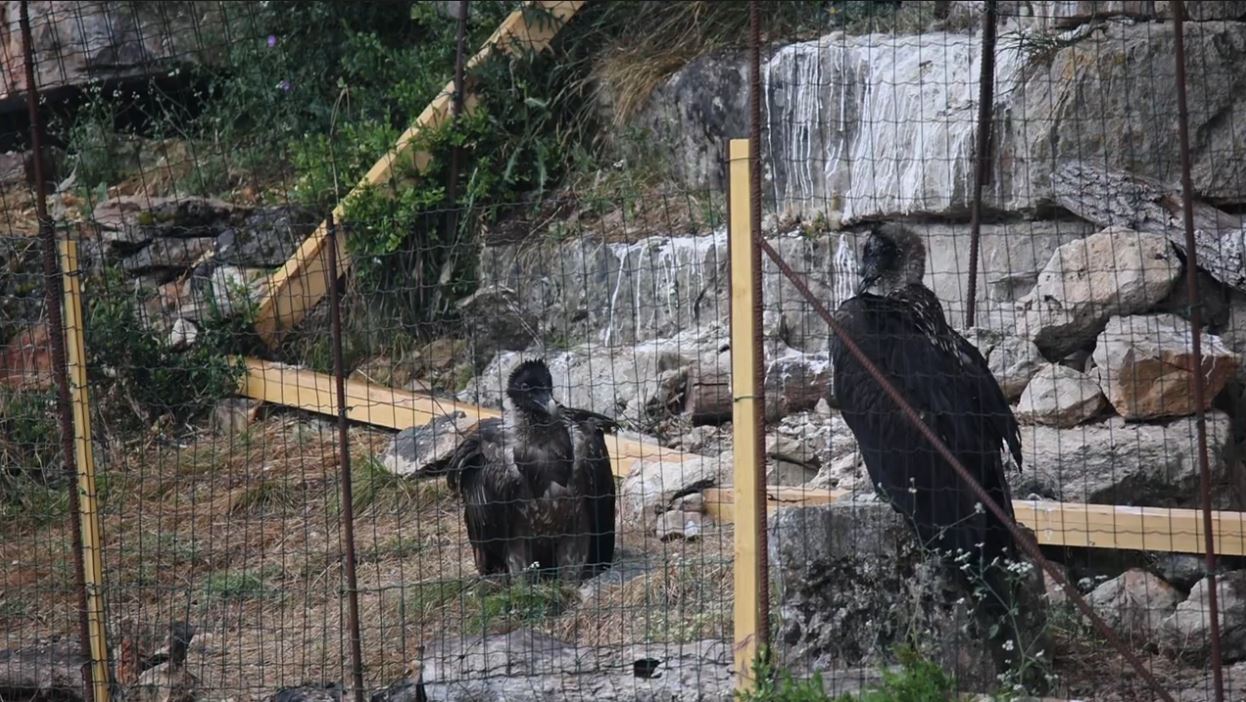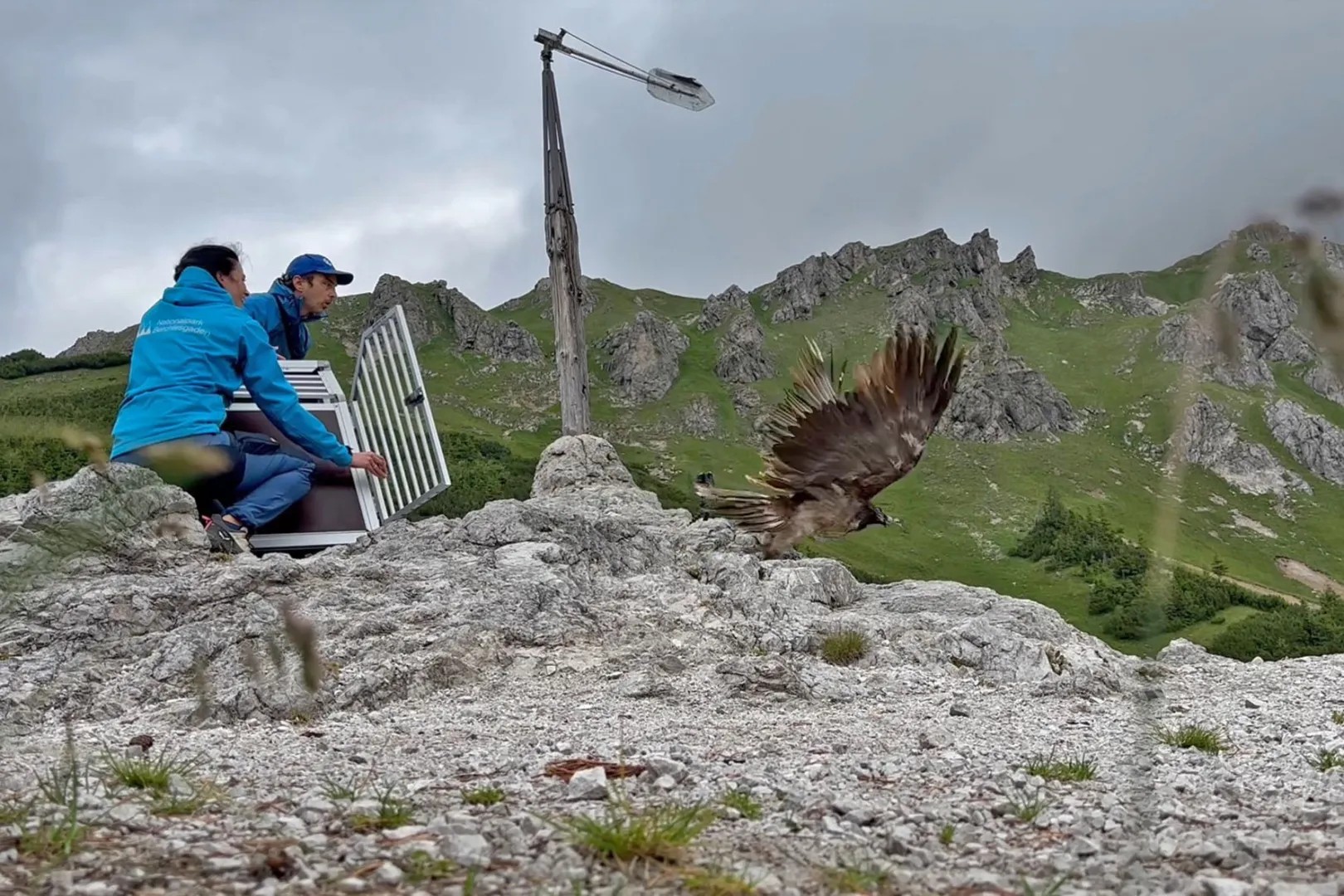
An international partnership continues to work rigorously to take care of Bearded Vultures in captivity and save the newly hatched chicks during the COVID-19 crisis to conserve Europe’s rarest vulture.
“While taking all the precautions and following all the rules and guidelines established by the different authorities, we continue to work so that we can enjoy and see bearded vultures in the wild when this terrible pandemic is over,” states José Tavares, the Vulture Conservation Foundation’s (VCF) director.
As the COVID-19 crisis is unravelling, the Vulture Conservation Foundation (VCF) continues to protect Europe’s vulture species — Bearded, Cinereous, Griffon, and Egyptian Vultures. This pandemic gravely impacts the VCF’s Bearded Vulture Captive Breeding Network (Bearded Vulture EEP), included in the European Endangered Species Programme, and managed by the VCF on behalf of EAZA. The network aims to breed the species in captivity for conservation purposes, mainly to reintroduce or restock the Bearded Vulture population in different priority areas in the wild across Europe. Currently, the breeding season is in full swing, with 36 chicks already hatched and 25 still alive. In addition to the usual challenges this entails, the whole network is facing unprecedented new difficulties, but together, we are facing them head-on.
How COVID-19 is affecting the Bearded Vulture EEP
“Our beloved Bearded Vultures do not know about confinements or special restrictive measures, making it necessary to be cared for and fed daily by all the personnel that work with this species in captivity under very difficult conditions in order to comply with the safety measures established by the governments for the COVID-19, and be able to obtain the maximum number of chicks so that the reintroduction projects can be continued,” says Alex Llopis, VCF’s Vultures Captive Breeding Manager and Bearded Vulture EEP Coordinator.
The Bearded Vultures in captivity still need to be fed, monitored and taken care off, and human keepers across Europe continue to do so daily. Apart from the daily tasks required at facilities, the Bearded Vulture EEP needs to ensure that Bearded Vultures rear the newly hatched chicks. This is essential to avoid human imprinting, where Bearded Vultures will recognise humans as their species, and therefore will not be able to breed once they become sexually mature, and consequently, they cannot be released into the wild. To ensure natural rearing, chicks usually need to cross many borders to be transferred to other centres where Bearded Vulture foster pairs can adopt them. But with the global travel restrictions, this is no longer possible. So, as coordinators of the Bearded Vulture EEP, the VCF developed emergency plans.
Emergency protocols
The VCF developed emergency protocols to address the consequences and solutions to transportation limitations, which will impact natural rearing. There are two protocols established for different circumstances.
- The first protocol requires building a box inside the nest when adoption by biological parents is not possible because the parents stopped incubating or adoption failed. This allows chicks to have direct visual contact with their parents, but no physical contact, as this can prove to be fatal – sometimes parents injure or kill their offspring if they stop breeding for one reason or the other.
- The second protocol entails a double adoption and occurs when there is a double-clutch. Bearded Vulture nestlings cannot be in the same nest due to an evolutionary behaviour called ‘cainism’ where the chicks fight aggressively, leading to the death of the youngest sibling. To solve this, the facilities build two nests with a wooden plank separating the chicks.
From Spain to Italy to Germany to Bulgaria — the partners of the Bearded Vulture EEP partners are going out of their way to adopt these measures to ensure the best outcome for the chicks. A big bravo to all of them for their continued diligence and commitment to conserve the species! The issues of natural rearing are handled, but a new challenging is approaching, the release of the captive-bred birds. The VCF is already developing new emergency plans to tackle this problem in the hope to ensure the best possible results.
A crisis is often also time for innovation that leads to transformation, so maybe with these protocols and new experiences, we will learn something new that will improve the captive-breeding of Bearded Vultures.
The Bearded Vulture EEP partners
The Vulture Conservation Foundation (VCF) collaborates with over 40 zoos and breeding centres, coordinating the breeding of Bearded Vultures for their eventual release to the wild. Each partner plays an essential part within the Bearded Vulture EEP. Breeding centres usually specialise in different fields, such as dealing with the most challenging pairs, and zoos host established pairs and focus on breeding offspring. A big thank you to all members for their continued work:
- AACHEN zoo (Germany)
- ACADEMIE DE FAUCONNERIE DU PUY DE FOU (France)
- AMNÉVILLE Zoo (France)
- ASTERS (France)
- BARCELONA Zoo (Spain)
- BEAUVAL ZOO (France)
- BEOZOO (BELGRAD, Serbia)
- BERLIN ZOO (Germany)
- Centre de Fauna Vallcalent CFV (Spain)
- Centro de Cría Guadalentín CCG (Spain)
- CHOMUTOV (Czech Republic)
- CORDOBA ZOO (Spain)
- FPWC – CWR (Armenia)
- FRANKFURT (Germany)
- GOLDAU (Switzerland)
- HELSINKY (Finland)
- INNSBRUCK (Austria)
- JEREZ (Spain)
- LA GARENNE (Switzerland)
- LIBEREC (Czech Republic)
- MónNatura (Planes de Son, Spain)
- MOSCOW (Rusia)
- NIKOLAEV ZOO (Ucraina)
- Novosibirsk Zoo (Rusia)
- NUREMBERG (Germany)
- Oasi di Sant’ Alessio (Italy)
- OSTRAVA (Czech Republic)
- Parc Animalier des Pyrénées (France)
- Parc des Oiseaux (France)
- Parc Pairi Daiza (Belgium)
- Parco Natura VIVA (Italy)
- Plock (Poland)
- POSEN (Poland)
- PRAGUE (Czech Republic)
- Private M. Horstmann & B. Sloman (England)
- Private MONTICELLO Montowl (Italy) Dir. Enrico Albertini
- Rescue Center GREEN BALKANS (Bulgaria)
- Richard Faust Centre RFZ (Austria)
- RIGA ZOO (Letonia)
- SCHÖNBRUNN (Vienna, Austria)
- TALLIN (Estonia)
- TIERPARK FRIEDRICHSFELDE (Germany)
- TORREFERRUSSA (Spain)
- WALSRODE (Germany)



